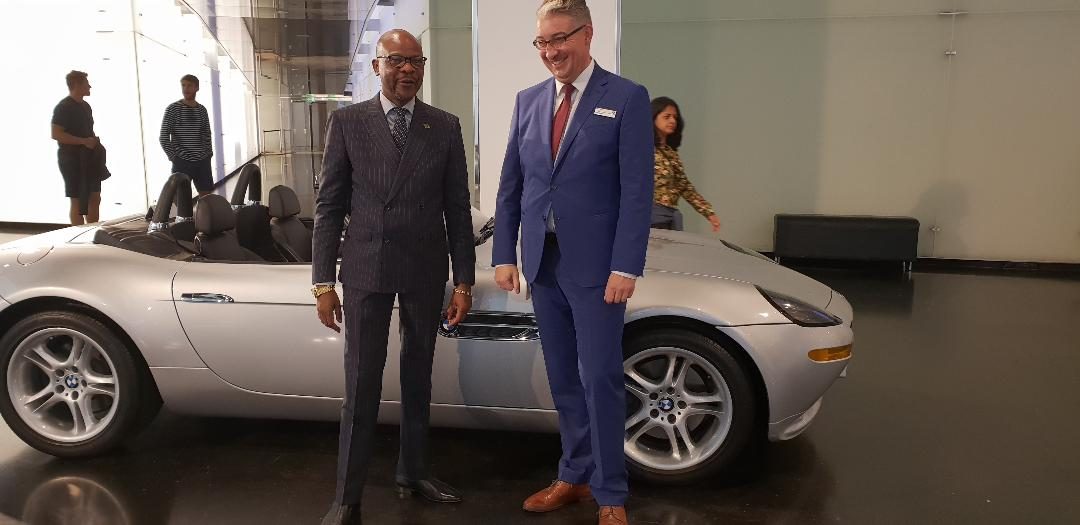…..Mukwita invites BMW
Munich, September 27, 2019
Zambia’s Ambassador to Germany His Excellency Anthony Mukwita has invited Bayerische Motoren Werke or Bavarian Motor Works in English, BMW, the German car manufacturer, to set up a plant in Zambia to manufacture electric components for their cars. Ambassador Mukwita said Zambia has abundant copper and cobalt resources that are key in the manufacture of electric car components.
Mr. Mukwita made the remarks at the BMW Headquarters in Munich where the Zambian flag was flying next to that of Germany, the company and the State of Bavaria to mark the official visit of the Zambian envoy. He spoke during a working lunch with the company’s top officials who included Christian Bahoo who is in charge of Government and External Affairs for the Middle East and North Africa, Kai Zobelein in charge of Steering Governmental and External Affairs and Sustainability Communications and Brigitte Kleinbeck in charge of Raw Material Management, Energy, Fasterners, Plastics, Chemical Products and Process Materials.
“We would like you to come and set up shop in Zambia and manufacture those components whose role materials such as copper and cobalt are in abundance in Zambia” said the Zambian envoy. Ambassador Mukwita told BMW that Zambia offered the required investment climate that included a stable political climate as evidenced by the peace that has characterized the nation since her independence from Britain in 1964.
“In addition, Zambia is a country of laws that protect your investment”, Mr. Mukwita said adding, “and we are a nation of 365 days of sunshine”.
In his remarks, Mr. Zobelein said BMW was open to the possibility of doing business with countries in possession of materials the company needs. “But we are also concerned about the need for the respect of human rights especially as they pertain to child labor”, Mr. Zobelein pointed out adding, “our customers would like to make sure that our product does not carry materials from sources that are engaged in child labor”.
Mr. Zobelein and Mrs. Kleinbeck just returned from the Democratic Republic of Congo where they visited some mining operations. In response, Ambassador Mukwita assured the BMW officials that Zambian mining operations had an excellent record of human rights and no children are engaged in mining activities.
Mr. Bahoo told Ambassador Mukwita that BMW was also equally interested in the progress and processes regarding the recently launched African Free Trade Area under the auspices of the African Union, AU. For BMW, Mr. Bahoo said the Free Trade Area presented some business opportunities that could encourage further investment on the African Continent. Currently, BMW only has two plants in Africa – South Africa and Egypt out of 35 the company operates around the world.
The Zambian envoy indicated that significant progress has been made as the majority of African countries have signed the agreement including Zambia.
The BMW plant in Munich sits on a one-hundred-acre plot producing one thousand cars per day or one car per minute. 25% of the cars are sold in Germany, another 25% in Europe while the rest are exported to the US and the rest of the world.
Sometime last year, Dr. Albert Muchenga of the African Union made a presentation at Africa Verein, a German business association conference in Berlin attended by Ambassador Mukwita at which he called on copper producing countries to take advantage of the introduction of electric cars to gain more out of their natural resources.
The matter was again a subject of discussion at the recently held inaugural economic summit in Livingstone organized by the Economic Association of Zambia, EAZ, which was officially opened by President Edgar Lungu and attended by his Kenyan counterpart, Uhuru Kenyata and former Tanzanian President Jakaya Kikwete. Ambassador Mukwita attended at the invitation of the EAZ. At the summit, the Zambian government and its envoys abroad were challenged to play a part in persuading car manufacturers to look to Zambia for their electric car materials.
The visit to BMW was therefore part of the follow up on the conference resolutions that should position Zambia strategically as the world takes measures to mitigate the impact of climate change by gradually reducing heavy dependence on fossil fueled cars to electric vehicles.

